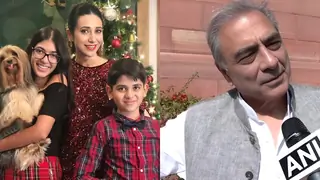12-year-old Sufi singer captivates audience | |||
| Can life be compared to a mobile phone! Yes, if 12-year-old Sufi singer Rais Anis Sabri is to be believed. He says, life is like a SIM card of uncertain validity that needs frequent recharge, to connect to the Almighty through prayer - the outgoing calls - and receive the divine grace - the incoming calls. He calls every earthquake or tsunami a missed call urging people to always remember their Lord. A phenomenally talented artiste, Rais Anis Sabri is a sixth grade student from Jalalabad, Uttar Praesh, who is currently making waves in the world of Sufi Qawwali music. Son and disciple of Rais Sabri, who in turn is a disciple of famous Qawwal Aslam Sabri, Anis is one of the youngest performing sufiana qawwals in the subcontinent.. He began to learn the intricacies of this genre of performing art from his father at the tender age of four and at seven gave his first performance. He already has several CDs to his credit and one of his albums 'Chisti Rang' is a household name. This child protege's performance was held at Music Academy in Chennai on October 26, 2007. The event was organised by Amir Khusro Sangeet Academy, a non-profit, registered, trust given to promoting Hindustani classical and related genres in Chennai. "With his quick repartee, clear enunciation conveyed soulfully, Anis' rendition is characterised by intensity, elan and exuberance of the mystical singing tradition established some seven centuries ago in the subcontinent," said Jyoti Nair Belliapa, founder-trustee and vice-president of the Amir Khusro Sangeet Academy, while introducing this rising star to the Chennai audience. Dressed in bright orange robes and a sequined cap rimmed with the same colour, the lad was oozing with confidence. He began his performance with an invocation to Allah, hitting the high notes with "Allah Hoo". The next was a power-packed performance, 'Mere Ghar Aaana Pyaare Nabhi.' When he sang his popular number 'Chishti rang,' he was in his full form. His showmanship and confidence were at their best during this performance. He sent the audience on a soul-searching mission when he sang 'Maa Baap Ka Dil Na Dukha.' The depth and the range of his voice charmed the audience who listened to the artiste with great admiration. When I asked Rais Anis Sabri who he admired the most, pat came the kid's reply, Nusrat Fatheh Ali Khan. I asked him what he liked about the late legendary singer: "His sargam and the alaap - the mix of the two and the way he used to weave all this during his performance. I, too, enjoy breaking into that kind of mould, but I am still a learner," Anis said. Rais Anis Sabri's composition reflects a substitutive change that's going on in the popular singing tradition. The child artiste deftly weaves together some complex spiritual concepts by resorting to disarmingly simple analogies. As he was warming up, he made a few cracks on how the devout these days are fixated on the TV remote and watch serials. He even did a parody of the film song; 'Aashiq Banaya.' He also talked about cricket stars like Dhoni and Sachin who occupy most of the space in today's youths' lives than the religious characters of one's faith. The emotionally charged interactive ambience had admirers walking up to the artiste, mid-way through the performance, to shower him with money (nazranas) as tokens of appreciation. Women, looking like Marwaris or Jains, burqua-clad women, obviously Muslim, and look-alikes of Bipasha and Karena were all doing the rounds, up and down the stage. So were men, wearing all kids of dresses symbolising different religio-cultural backgrounds. People were coming on to the stage literally every second minute. Many sent their kids, but a lot of elders stood on the stage carefully counting out the notes, till they were exhausted. Through it all, the performer didn't skip a beat, he 'salaamed' graciously and kept the money aside, singing all the while, or bowed down, when many of them tossed notes, one by one, on his head. Within his two hours of performance, believe me, not less than Rs 50,000 must have been sprinkled on the stage. Celebrities like Vyjayantimala Bali, film director Vijay T. Rajendran and many others were among the audience in the jam-packed auditorium. People with Rs 500 tickets were seen standing on the aisles and some even squatted on the path. People were clapping and shaking their heads as the wonder kid sent everyone into raptures. The boy spotted Vyjayantimala Bali, the heartthrob of the sixties, leaving the hall and requested her to sit down again and listen to his 'Bandh'. Vyjayantimala dutifully obliged him and while leaving, gave a bend-down salutation in Mughal-e-Azam style. As it was free flowing music, everyone had licence to go on stage. Gokul Das, a top builder of Chennai city, was so overwhelmed by the performance that he took out his Rolex watch and presented to the talented performer. He sat all through the show sporting a white Muslim cap. The most defining moment was when Tamil director Vijay T. Rajendran emptied his wallet on the boy. Someone gave the bearded celebrity the microphone and he addressed the audience with Salam-Wale-Kum. Speaking in Tamil, he laced his speech with words like Masha Alhah and Subhan Allah to praise Rais Anis Sabri. He got thunderous applause when he said whenever he takes food, he begins it with Bismillah. The director promised Anis a chance to sing in his forthcoming film. The Sufi musical tradition began at the hospice of the Sufi saint Hazarat Nizamudin Auliya of Delhi in the late 13th century India. His disciple Hazart Amir Khusro is credited with having characterised the Sufi singing tradition marked by high musical intensity lan and exuberance that's known to us as Qawwali. Qawwali normally start with an instrumental prelude where the main melody is played on the harmonium, accompanied by the tabla. Then comes, the alap, during which the singers intone different long notes, in the raag of the song to be played. The lead singer begins to sing some preamble verses after which the side singers repeat them with their own improvisation. This leads into the main song with members joining the singing of the verses that constitute the refrain, playing the musical instruments and clapping. The verses of Qawwali repertoire are suffused with mysticism and esoteric content. These have been passed down largely through oral traditions. The poetry is implicitly spiritual in its meaning and the central themes are love, devotion and longing of the individual for the Divine. The song usually builds in tempo and passion, with each singer trying to outdo the other in terms of vocal acrobatics. The 'Zikr' and 'Sama' creates a hypnotic state both among the musicians and the audience. So electrifying is the music that the listeners and the artistes at times find themselves transported into a state of 'wajad,' a trance-like state where they feel at one with God - generally considered to be the height of spiritual ecstasy in Sufism. "Not everyone can experience such a state of mind. The person who has deep knowledge of the history and understanding of the language can only experience this flight of ecstasy," says Qawwal Ustad Muna Shaukat Ali, president, Amir Khusro Sangeet Academy. "The job of the Qawwal is to sing with deep devotion and use his body movements and musical expertise to create an atmosphere of transcended rapture - a state of mind where the person does not have control over the body and goes into a tizzy, intoxicated by the divine music," he said. "Those who go into that state of spiritual trance may not soon return to normalcy and may take some time to get back to earth. There are many instances in recorded history where people have passed away in such a state of mind," the veteran Qawwal said. Earlier, Jyoti Nair Belliapa announced the Amir Khusro Sangeet Academy lifetime achievement awards that were conferred on poet Abdul Rahman and Prof Sahfiuualh for their outstanding contribution to Urdu literature. Dr Hakim S A Syed Sathar got the honour for his public service. Some of the previous recipients of the Amir Khusro Sangeet Academy's lifetime achievement award are: late Ustad Bismillah Khan Sahib, A R Rahman, M S Viswanathan, N Ram, D K Pattamal, the late Dr Cherian, Mrs YGP, Vyjayantimala Bali, Shovana Narayan, R Santhanam, the late 'Hamsadhwani' Ramachandran, the late S V Krishnan and Meera Savoor.
http://www.chennaionline.com/music/Events/Nov07/11article28. asp |



































